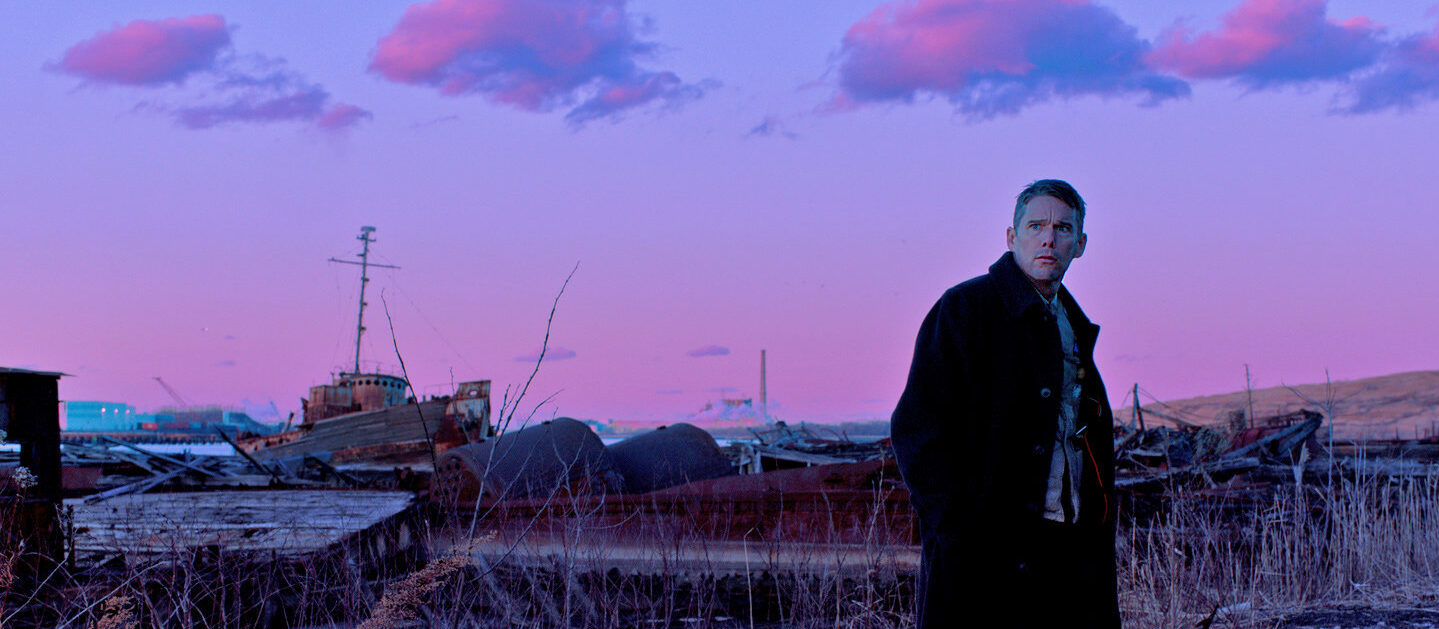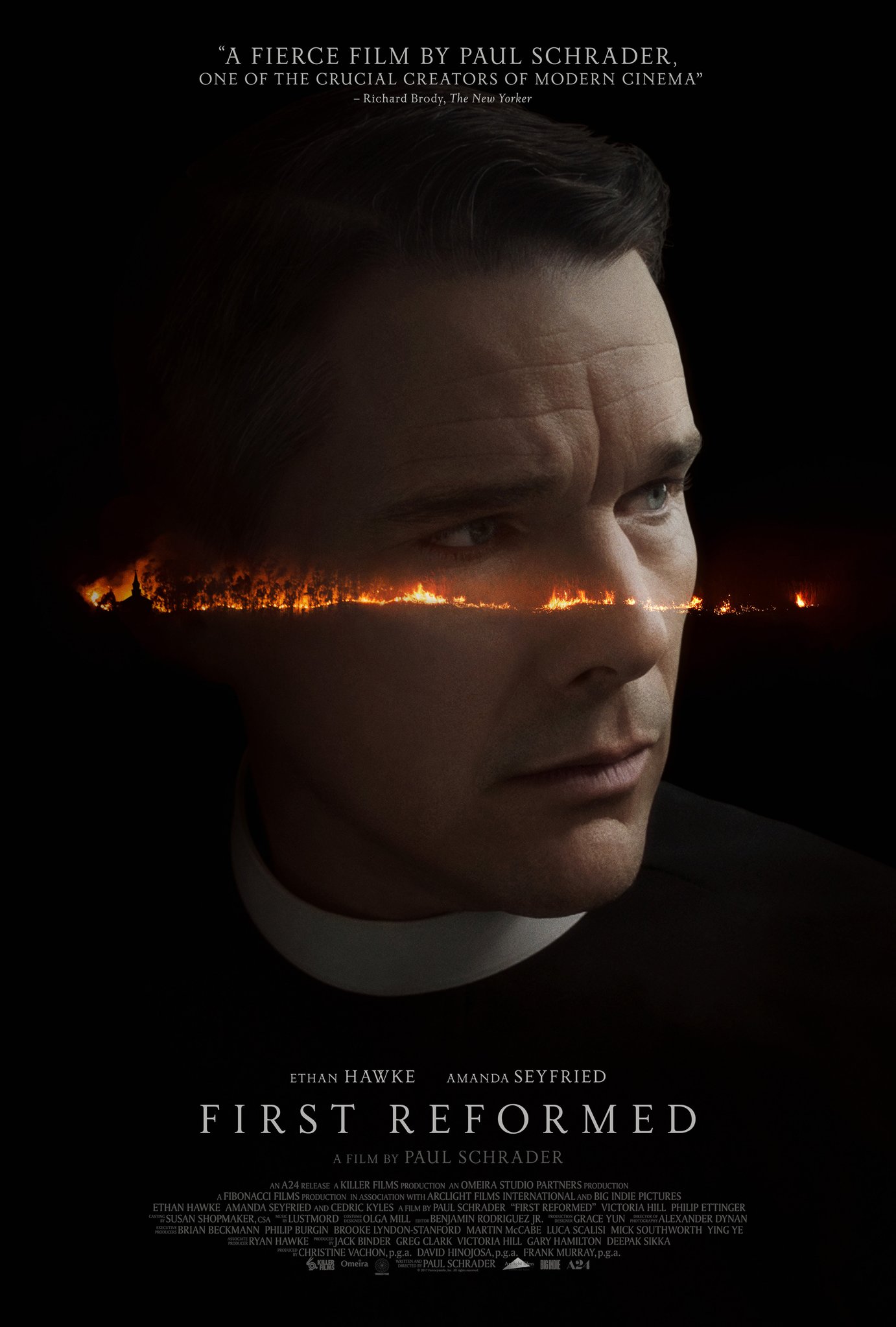

“A life without despair is a life without hope. Holding these two ideas in our head is life itself.”
Paul Schrader’s First Reformed is simultaneously unlike anything else the filmmaker has ever produced and a logical culmination of his life’s work.
Prior to his career as a writer and director, Schrader worked as a critic under the tutelage of Pauline Kael. In 1972, he penned a book called Transcendental Style in Film: Ozu, Bresson, Dreyer. From the back cover blurb: “Unlike the style of psychological realism, which dominates film, the transcendental style expresses a spiritual state by means of austere camerawork, acting devoid of self-consciousness, and editing that avoids editorial comment.” The book details the similar styles of the three named directors (Yasujirō Ozu, Robert Bresson, and Carl Theodor Dreyer), positing a shared cinematic language despite vastly different cultural backgrounds, and shows the writer’s clear appreciation of their methods. However, when Schrader began writing and directing himself, he made films entirely unlike those of his influences—films that are violent, unseemly, forceful, suggestive, sexual, stylized, exploitative. It wasn’t until First Reformed that Schrader made an honest to goodness transcendental film using the framework laid out in his own book. In that sense it’s unlike the rest of his oeuvre.
On the other hand, First Reformed is thematically aligned with the most personal of the auteur’s works. Consider the emotionally conflicted and often alienated protagonists of Taxi Driver, Hardcore, American Gigolo, Light Sleeper, or The Walker and their struggles with guilt, despair, and loneliness. From that perspective, Reverend Ernst Toller (Ethan Hawke) is a quintessential Schrader leading man.
Despair is a development of pride so great that it chooses one’s certitude rather than admit God is more creative than we are.
The pastor of a historic church with few congregants, Toller carries with him a failed marriage and a son killed in a war with no moral justification. A distant, humorless man, he is caught off guard by a counseling request from Mary (Amanda Seyfried) and her husband Michael (Philip Ettinger), two climate activists who are struggling with the idea of bringing a baby into a world that will be irreparably damaged by the time that child is an adult. As he grows more invested in this family, he comes to champion their cause; to believe that, just as he has ignored and exacerbated his own physical and spiritual ailments for too long, humanity has turned a blind eye to the destruction of its own habitat. This newfound passion puts him at loggerheads with Pastor Joel (Cedric Kyles), who heads up the corporatized megachurch that supports First Reformed, and especially Ed Balq (Michael Gaston), a local industrialist and benefactor who is funding the church’s 250th anniversary reconsecration.
I’m not the first to make the observation, but Toller is essentially the physically-afflicted clergyman from Bresson’s Diary of a Country Priest (First Reformed is structured around Toller’s daily journal entries) transposed into a 21st century version of Bergman’s Winter Light, his crisis of faith stemming from the ramifications of climate change rather than the prospect of nuclear annihilation.
Where the vast majority of message films fall flat on their faces—and if indeed First Reformed should be viewed as such at all—Schrader’s film succeeds because it’s not trying to preach a sermon, awash in leftist politics and reformed doctrine though it may be. Schrader’s no preacher of any stripe, least of all an orthodox one. Instead, the film shows a man paralyzed between extremes and uncertain if any move is the right one, or if there is any ultimate significance to anything he does. Surely one must accept their own portion of earthly suffering, but is it right to develop a Gethsemane complex, always and exclusively praying and sweating blood? Certainly a Christian is called to be a good steward of the earth, over which he was given dominion, but does environmental stewardship take precedence over God’s command not to murder?
Further, Schrader’s screenplay reaches beyond its central fixation to contemplate larger ideas. Is the cross of Christ equal parts blessing and curse? Can one find purpose in life without community? Is the storing up of treasure in heaven, which neither moth nor rust can destroy, nor thieves break in and steal, worth ostracization from a materialist culture? How does one reconcile feelings of hope and despair, meaning and meaninglessness, sin and sanctification, suffering and joy, death and resurrection, fasting and feasting? Where does the strength come from to soldier on when the world and its underlying structure lose their sense of order?
I can promise you that whatever despair you feel about bringing a child into this world cannot equal the despair of taking a child from it.
There could certainly be some nitpicking—the connection between churches and industrial pollution feels somewhat tenuous, the youth group sequence is marred by caricature, and both Toller’s platitudinous response to the question of whether God can forgive us (“Who can know the mind of God?”) and his grim decision near the end of the film do not quite fit the character even considering his recently-updated worldview—but First Reformed should be commended for its willingness to boldly discuss difficult issues without flinching, to admit that those problems have no easy answers, to illustrate that our theology (of whatever persuasion) informs how we live our lives, to refrain from any sort of mocking, and to match its theme of spiritual crisis with a patient, ascetic style learned from the old masters. Over and above the film’s call to environmental stewardship is a reminder, reinforced by the church’s trap door from its participation in the Underground Railroad, that the Christian faith is not a neat set of theoretical ideas but a radical way of life.